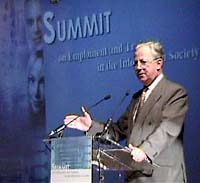BRUSSELS, September 23, 1998 — At a summit meeting hosted by Microsoft and several other leading technology companies yesterday, more than 150 European policy makers, information technology executives and government officials called for public and private action to address the growing shortage of skilled technology workers in Europe.
New research by International Data Corporation (IDC) and Microsoft, which was released at the summit meeting, highlights the growing crisis in technology skills in Europe. IDC and Microsoft estimate that by the end of 1998 there will be 510,000 unfilled jobs in Europe’s technology sector, growing to 1.6 million by 2002.

Jacques Santer, president of the European Commission, opened yesterday’s summit meeting by stressing the
”
immense importance
”
of a vibrant information technology industry to the future of the european union.
These posts remain unfilled due to a serious shortage in skilled information technology (IT) professionals. This shortage will result in European employers paying exorbitantly high costs for these skills, the delay of key projects, lower employee productivity due to a lack of IT resources and support, less return from existing IT investment, and increased use of offshore resources. All of these factors will significantly affect Europe’s ability to compete in a world where the effective use of IT investment is an increasingly critical factor in helping businesses remain competitive.
Jacques Santer, president of the European Commission, opened the conference by reminding attendees that they were considering “issues of immense importance for the future of the European Union. We, in the European Commission, have been mandated to make a political and strategic report on these issues to the European Council of Heads of State and Government in Vienna in December. So your conclusions are of direct relevance to us. We will be evaluating them very carefully.”
“The issues all form a part – a crucial part – of an emerging vision of the future of Europe,” Santer said. “I believe it is an exciting vision(but there are) unfilled job vacancies in the European Union – thousands and thousands . . . Urgent action is needed to deal with this.”
The summit meeting issued a call to action in an effort to prompt public- and private-sector initiatives that can begin to resolve the technology skills gap, which acts as a brake on European economic growth. The call to action focuses on the need for partnership between the public- and private-sectors and the vital roles of both:
-
Member states – educational reform is the most important area in which member states can make a lasting contribution. Technical literacy must become an imperative of the educational process and integrated into the curriculum at all levels. Schools must be given the tools and computers they need, computers and teachers trained to impart to students the skills they need. And member states must encourage vocational schools and public employment agencies to move quickly to place greater emphasis on IT training for the chronically unemployed and those seeking new opportunities.
-
Industry – Industry must treat investment in people as a top priority and invest in employee training. It must strengthen links between education, training and work life, and promote partnerships with schools and universities. Industry must also look more closely at non-traditional sources for IT professionals and invest in childcare, part-time work and telecommuting
-
European Union – The EU is best placed to provide a framework for partnership between the public- and private-sectors. The EU is already making significant contributions, funding pilot projects, encouraging joint initiatives and drawing attention to the challenges ahead. The EU is to be commended for these efforts.
The call to action from the summit meeting says that to provide a structure for ongoing co-operation between industry and government, the European Commission and the Member States should establish a high-level advisory group to address the IT skills gap, the broader circumstances that have given rise to it, and the rapid pace of technological change. This group, which would report directly to the Commission, should bring together industry and public sector representatives, consistent with the importance of partnership in this area.
Chairman of Microsoft Europe, Middle East and Africa, Bernard Vergnes commented on the Summit: “If Europe is to remain competitive in the long term it is imperative that the private and public sectors work together to help close a potentially damaging skills gap growing in Europe,” said Bernard Vergnes, chairman of Microsoft Europe, Middle East and Africa. “This Summit was designed to create a positive forum where representatives on both sides can discuss the issues and come to an agreement on the way forward. Microsoft has been committed to helping address the skills gap in Europe for some time with a wide variety of initiatives, but to have a major impact we must co-operate and share common thinking with our colleagues in both the IT industry and government. Not doing so would greatly hinder Europe’s economic progress.”




